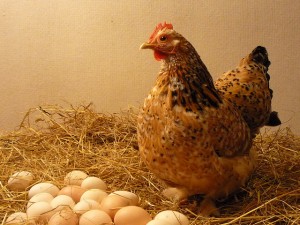Chickens are a bit fickle about cold weather, but the last thing that you want them to do is stop laying eggs. In a survival situation, that could be catastrophic. Fortunately, with just a few modifications, you can keep those hens clucking right along no matter how cold it gets!
If your chickens have already stopped laying eggs, don’t worry – it’s fixable and luckily you’re learning these tips now instead of in a SHTF situation that makes eggs crucial to survival. If you’re still getting eggs but would like to increase your production, following these tips will help.
Let’s get crackin’.
Why Do Chickens Stop Laying in Winter?
In order to understand why your chickens stop laying eggs in the winter, you need to remember why they lay eggs to begin with. Regardless of how it may seem, it’s not so that you can have omelets and bake cakes! Chickens lay eggs to reproduce and in the winter, the chicken’s body, specifically its endocrine system, shuts down egg production because winter isn’t the ideal time for chicks to be born.
Shed Some Light on Your Chickens
 But how does the endocrine system know that it’s winter? Because the days get shorter. It’s not daylight for as many hours as it is in the summer and that, friends, is the answer. If you want your chickens to keep producing eggs, adding lights is a good place to start.
But how does the endocrine system know that it’s winter? Because the days get shorter. It’s not daylight for as many hours as it is in the summer and that, friends, is the answer. If you want your chickens to keep producing eggs, adding lights is a good place to start.
In a SHTF scenario, this may not be feasible, but it’s the best way to boost egg production and keep your egg factories from shutting down.
Use common sense if you decide to install lights. They are fire hazards so keep them where your chickens can’t knock them over.
Also, you only need to add a couple of hours to the day, though you can leave them on 24/7 for light and heat if you’d like. At the minimum, make sure that they’re getting 14 hours of light per day. When you add those few hours isn’t nearly as important as just doing it, though many people prefer to add it in the morning.
Weird fact: Red light seems to reduce cannibalism and pecking and have a calming effect on chickens.
Increase Protein
Chickens need plenty of protein in order to lay regularly. In the winter, they burn more calories trying to stay warm so they need more food just to survive.
If you notice a drop in production, add in some soybeans, wheat, corn, oats, sunflower seeds, alfalfa, or your protein of choice.
Keep Your Chickens Warm and Toasty
Chickens don’t deal well with drafts or dampness so sealing your coop up so that it’s warm and dry will help boost egg production, or keep them from quitting on you.
Also, building the coop up off the ground will keep it drier, too.
Keep Them Feeling Safe and Healthy
Stressed chickens don’t lay eggs. If you have predators coming and going in the coop, lots of noise outside of the coop or other stressors that disturb your chickens, you’re not going to get eggs.
Cold is also a stressor so keeping your coop warm is important.
In the winter, predators are looking for warm places to hide, too. If you happen to be offering chicken nuggets as well as a warm place, your coop is going to be a hit. Secure it so that nothing can get in.
Finally, lice and other pests can irritate your chickens and even cause disease. This, of course, causes stress. Keep them bug-free and healthy.
Plan for Molting
 Don’t forget that chickens molt about a year or so after they begin laying eggs, then repeat the process annually.
Don’t forget that chickens molt about a year or so after they begin laying eggs, then repeat the process annually.
The molting process takes anywhere from 2-6 weeks. They’re probably not going to lay eggs while they’re molting so unless you just want to go that long without eggs, buy your chicks in batches so that they are a few months apart in age and won’t be molting at all once. Your overall production will still drop but at least you’ll still be getting eggs through the winter.
Keeping your chickens laying eggs through the winter requires a bit of finessing and tweaking the system but it can be done. The most important thing to remember is, as always, keep them happy because happy chickens lay eggs!
Source:Survivopedia.com

Leave a Reply